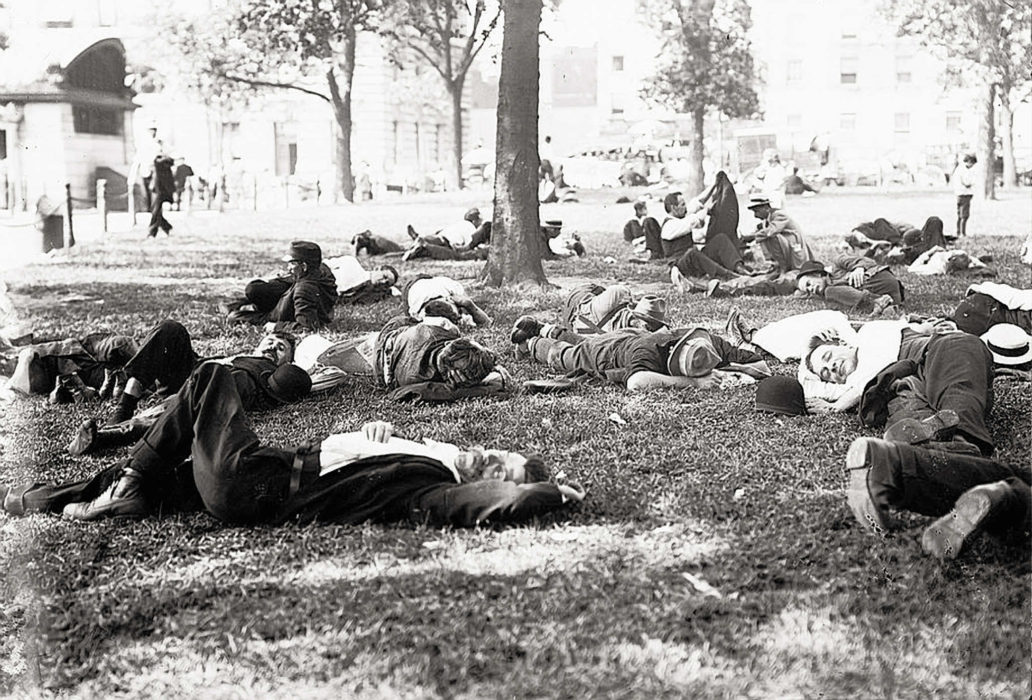“NINE DIED, THIRTY-SIX were prostrated, and two were driven insane by the torrid heat of yesterday,” the New-York Tribune said on its front page today, July 10, 1912. Two others died in Boston, nine in Chicago, and seven in Philadelphia, where the heat wave drove three people to suicide. Yesterday afternoon at 3 p.m., two thermometers on Broadway registered 100 degrees Fahrenheit.
“The heat in New York is very terrible,” Ahmad Sohrab, one of ‘Abdu’l-Bahá’s translators, wrote to Agnes Parsons on July 9. “Especially the last three days it has been unbearable, yet the Master is standing firm on his ground.” In spite of the heat, ‘Abdu’l-Bahá spoke to hundreds of people every evening at 8 p.m. in his house at 309 West 78th Street on the Upper West Side. “There is a great change in New York,” Sohrab wrote, “and although it is in the height of summer every night the three large rooms on the second floor are crowded by new people.”
Ahmad Sohrab had lived in the United States since 1901, and had arranged many of ‘Abdu’l-Bahá’s speaking engagements in America. Agnes Parsons, whom ‘Abdu’l-Bahá had stayed with in Washington, had already invited him to visit her summer home in Dublin, New Hampshire, but he had turned her down. “It will be well if you write him at this time another letter asking him to go to Dublin,” Ahmad told her. “I cannot see him living through this heat. It melts iron.”
The Sun called New York “a wilting, breathless furnace.” “The pavements were scorching hot,” the Tribune explained, “and little spirals of heat waves rose from the sun-softened asphalt and the burning sidewalks.” Even the horses were dying. Last year’s heat wave had killed more than 1,200 of them in the month of July alone.

“In the tenement house districts of the East Side, Harlem and the lower West Side the suffering was greatest. Only children and those whose work left no choice were to be found in the streets during the intense heat of the day.” In the past four days, churches and clinics had referred six hundred families to the Association for Improving the Condition of the Poor.
Battery Park was filled with those who didn’t have the means to leave the city for the coast. “The baths at the Battery were taxed to full capacity all day until they closed, at 9 o’clock at night.” For the past several nights thousands of people had slept on the grassy slopes of Riverside Park, just down the street to the right from ‘Abdu’l-Bahá’s house, in order to escape their sweltering tenements. (Willis Haviland Carrier, the inventor of the air conditioner, wouldn’t install his invention in a home until 1914, and it would cost $10,000.)
The Park Commissioner, Mr. Stover, didn’t appear to be moved by any of this news: he told reporters that he was closing the parks at night. Why? “Because there are a number of persons in this city who have been permitted in the past to sleep on the lawns in the parks because of the hot weather they take it for granted that they should be permitted to do so now. Well, I am not going to encourage that practice.”
The New-York Tribune didn’t seem to think such a hard-hearted, bureaucratic response was justified when people were dying from the heat. “Commissioner Stover gave no reason why he wished to close the parks other than his conviction that some people were prone to convert privilege into license,” they wrote.






